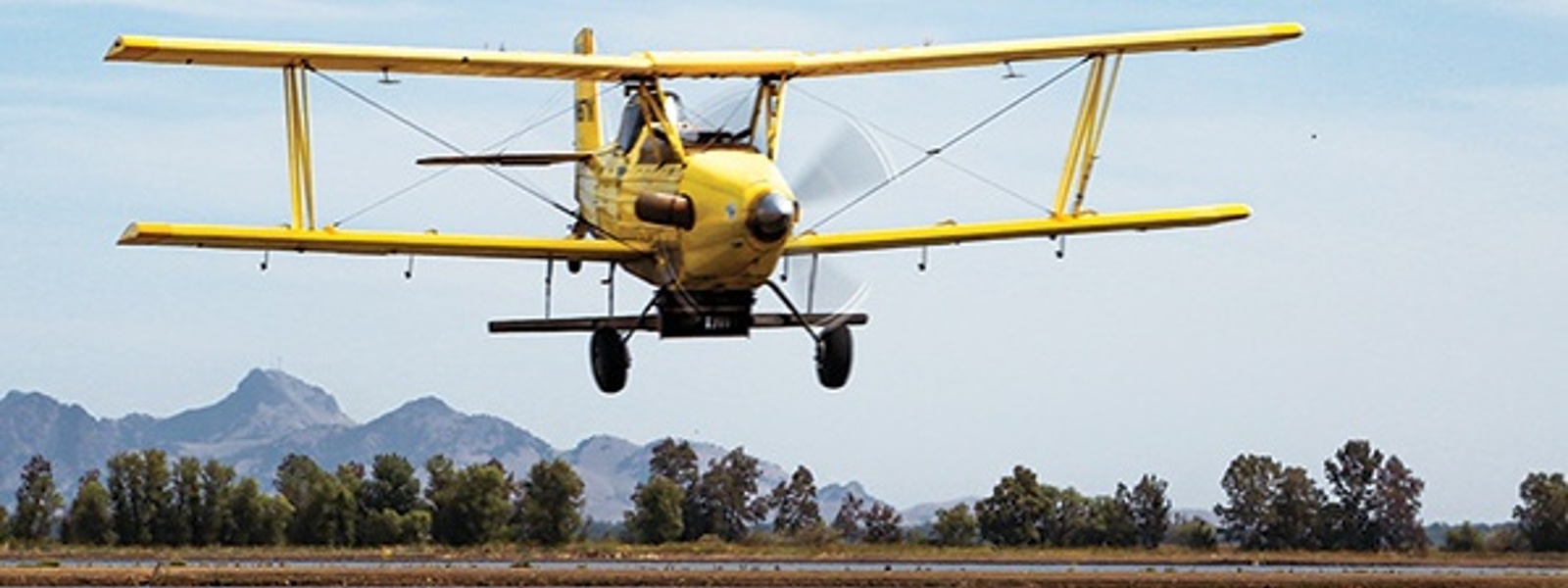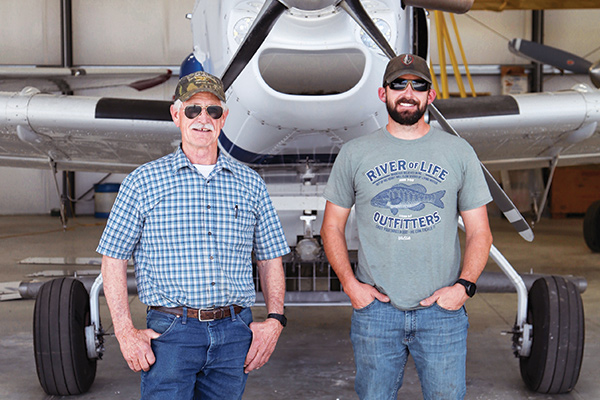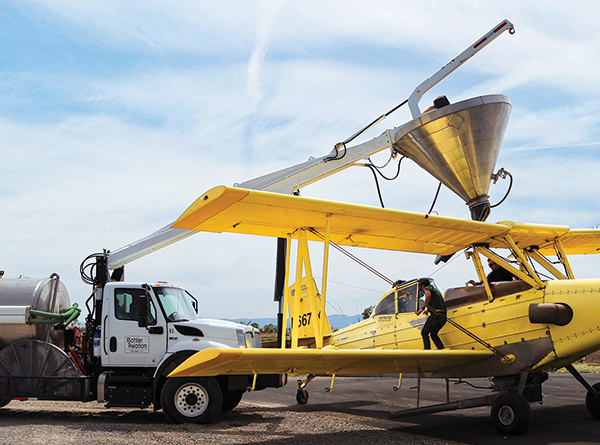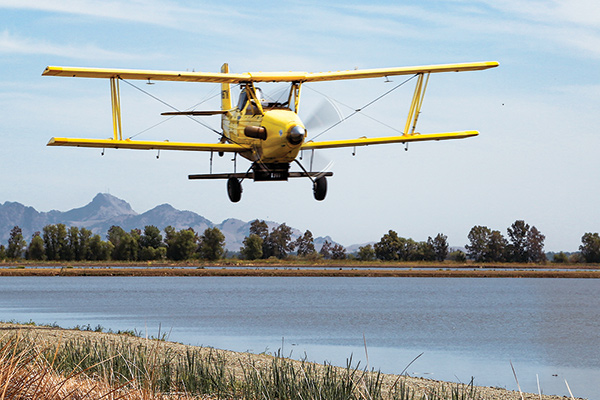Seeds from the sky

September/October 2022 California Bountiful magazine

Maxwell pilots plant
rice fields by airplane
Interview by Linda DuBois
Photos by Mitchell Yerxa
Rice is found in sushi, soups, side dishes and main dishes worldwide, and about 5 billion pounds of this popular staple are typically grown in the Golden State. Fields are planted in spring and ready for harvest by September.
Planting rice in shallow water helps control weeds and pests, more so than dry seeding. So, seeding by airplane has been the planting method of choice for many farmers for decades.
One company specializing in this is Richter Aviation in Colusa County’s Maxwell, where longtime owner and operator Rick Richter is transferring the management to his son, Nick.
When did you get started?
Rick: I started flying in 1973 while earning an ag degree at Chico State and have been an ag pilot since 1979. I started my own ag-pilot business in 1983. It was just a passion that I had since a young age. I grew up on a dairy farm west of Maxwell and one of my heroes was Nick Moller, the local crop duster who used to fly by and wave to me.
Nick: Whom I’m named after! I’ve been flying since 2009 but have been working around here since I was 9 years old.
Describe the seeding process.
Nick: The seeds are soaked for about 24 hours, which starts the germination process and helps it sink to the soil in the water. Trucks haul seed from the warehouse to a county airstrip close to the field.
Rick: We transfer the seed into our funnel bucket on the truck that carries seed to the airplane. The airplane goes up about 30 feet and the seed goes on from 150 to 300 pounds per acre.
Nick: We can cover about 12 or 13 acres per load before we have to refill the plane. We use a GPS system specifically designed for our industry. There’s also flow control that will change the rate (the seed drops), given your different ground speed going up and down wind.
Rick: Technology has really improved the industry through the years. When I started, we had flagmen on each end of the field. They’d count 30 paces and wave a flag. Now, the accuracy is way better.

How has the drought affected your business?
Rick: The irrigation districts in our area have pretty much come out with zero allotments for rice. Last year we serviced 42,000 acres and this year we’ll be around 6,000. This is the first time in my career of over 43 years that I have ever seen a situation like this. We’ve had to lay off employees and are running only two (out of seven) airplanes. Nick and I are doing all the flying. He’s having to go fly the corn run in Indiana and hopefully make enough to keep his family going for a while.
What are some other job challenges you face?
Rick: Along with being heavily regulated, a big challenge is trying to get all the work done in the smallest window possible for the grower. That's why we usually have so many airplanes and pilots.
Nick: In the last couple years, labor has been hard to find.
Rick: Another challenge is the weather. A lot of times, we have to let the wind calm down or get the wind in the right direction. We have to have 20 continuing education units every two years. Insurance cost is becoming a big problem.
Nick: And, it’s long hours and it's a dangerous job.
Who else in the family is involved in the business?
Rick: My wife, Brenda, is the secretary and does the books for the office. We’ve got two daughters as well (Jessica and Jenilee), but they went in different directions.
Nick: My wife, Jessica, worked here one summer before we had kids.
I heard that not enough young people are entering the field.
Nick: Oh, yeah. The average age is like 56. We’re actually mentoring a younger guy who’s 21. He recently got his private pilot license and he wants to get into the business. So, he's been on our ground crew for the last year and then hopefully within this next year, he’ll get his commercial license and then we'll take him under our wings and show him the ropes and get him started. … Every pilot needs to know what every ground crew is supposed to be doing. The pilot’s the supervisor on every crew so you need to be able to do every job that there is.

What planes do you have?
Rick: They’re called Ag Cats. They’re made by Schweizer, originally made by Grumman after World War II. They are 500-gallon airplanes with turbine engines that are Honeywell powered and have a thousand horsepower each. We have three of the 500-gallon model, one 400-gallon airplane and two 300-gallon radial engine Ag Cats. And I still have the same airplane that I started with in 1983. We still use it. Also, we have a brand-new one we just bought last year that’s 700 gallons, but it's a single wing built by Thrush.
What do you do besides rice seeding?
Nick: There's a little winter wheat but not as much as there used to be 10 years ago or so. Every once in a while, if it's a real wet spring, we will spray the almond orchards if they can't get to it with their air blast sprayers on the ground. But 95% of our work is rice.
Rick: We do fly over the acres that we seed five to six times through the season. We also do dry and wet herbicides, insecticides, fungicides and fertilizer applications. So, we take care of the crops from the beginning to the end.
What are some high points in your career?
Rick: I was honored to be the 2022 president of the National Agricultural Aviation Association. That put me in touch with people from California to Washington, D.C., and everywhere in between. So, it really opened my eyes to how big this industry really is and how much work we do. I’ve gained friends all over this country.
What do you do for fun in the off-season?
Rick: We’ve got a passenger airplane that my wife and I fly to Fort Bragg on the coast. We've got a vacation home over there that the family can use. So, that's kind of our outlet to get out of the heat of the valley, get away and put the business behind us and just enjoy the solitude that brings.
What do you find rewarding about your job?
Nick: It’s very rewarding to watch the rice fields throughout the years and know we had a part in helping that grow. I think of all the people all over the world that has fed.
Rick: One of the most rewarding things is to see my son follow me in the business and to have him fly beside me while I’m in the twilight of my career. This career’s put food on our table and enabled us to also buy property and farm rice and walnuts. I’m 70 years old and it’s time for me to step back and let Nick take over. But for as long as I can, I’m going to continue to fly.

